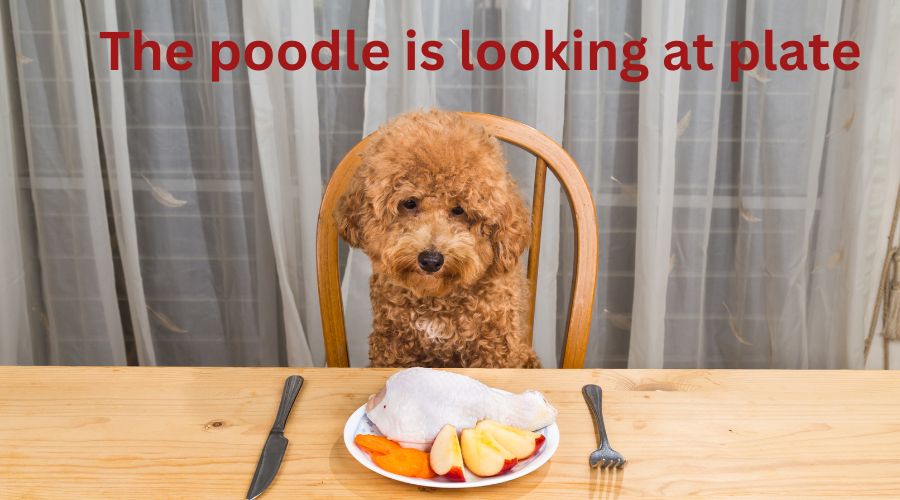As a poodle owner, you want to make sure your furry friend is getting the best nutrition possible.

A balanced diet is crucial for your poodle’s health and well-being.
Knowing what foods are safe and healthy for your poodle can be confusing, so we’ve compiled a list of foods that are safe and beneficial for your poodle to eat.
When it comes to feeding your poodle, it’s important to provide a well-balanced diet that includes protein, carbohydrates, and healthy fats.
High-quality dog food is a great option, but you can also supplement your poodle’s diet with fresh, whole foods. It’s important to avoid feeding your poodle toxic foods such as chocolate, grapes, and onions, which can be harmful to their health.
Additionally, it’s important to avoid giving your poodle table scraps, as they can be high in fat and salt and can lead to obesity and other health issues.
In addition to a healthy diet, it’s important to provide your poodle with plenty of fresh water and treats in moderation. Training your poodle to enjoy healthy treats such as carrots, green beans, and apples can be a great way to reward good behavior and provide additional nutrition.
By providing your poodle with a healthy diet and plenty of love and attention, you can help ensure that they live a long and happy life.
What Can Poodles Eat?

As a poodle owner, you want to ensure your furry friend is eating a balanced and nutritious diet. Here are some guidelines on what your poodle can eat.
Protein and Fat
Poodles require a diet that is high in protein and fat. Good sources of protein include chicken, beef, pork, and duck. Fish is also a great source of protein and omega-3 fatty acids, which are crucial for a healthy coat and skin.
Fruits and Vegetables
Fruits and vegetables are a great source of fiber, vitamins, and minerals for your poodle. Some safe options include apples, blueberries, carrots, green beans, peas, pumpkin, sweet potatoes, and zucchini. Avoid feeding your poodle grapes, onions, garlic, mushrooms, and avocados, as they can be toxic.
Nutrients and Minerals
Poodles need a balanced diet that includes essential nutrients and minerals. Calcium, sodium, magnesium, and potassium are all important for healthy bones and muscles. Iron is also crucial for healthy blood cells. Good sources of iron include red meat, poultry, and fish.
Toxic Foods
Some human foods can be toxic to your poodle. Chocolate, caffeine, alcohol, grapes, raisins, onions, garlic, and macadamia nuts should all be avoided.
These foods can cause anything from mild stomach upset to serious health problems like kidney failure.
Remember that every poodle is different, and their dietary needs may vary based on factors like age, weight, and activity level.
Consult with your veterinarian to ensure your poodle is getting the right nutrients and calories for their specific needs.
Feeding Poodles
Poodles are known for their elegant looks, intelligence, and playful nature. They are also known for their sensitive stomachs, which means that you need to be careful about what you feed them.
In this section, we will discuss the different types of nutrition that poodles require at different stages of their life.
Puppy Nutrition
Poodle puppies require a balanced diet that is high in protein, fat, and calories. This is because they are growing rapidly and need plenty of energy to support their growth and development.
Here are some foods that you can feed your poodle puppy:
- Commercial dry food: This is a convenient and affordable option that provides balanced nutrition for your poodle puppy.
- Home-cooked meals: You can prepare meals for your poodle puppy at home using a mix of protein, healthy grains, vegetables, and fruits.
- Some good protein sources include beef, chicken, turkey, lamb, veal, and fish.
Adult Nutrition
As your poodle reaches adulthood, their nutritional needs change.
They require a diet that is lower in calories and fat to maintain a healthy weight. Here are some foods that you can feed your adult poodle:
- High-quality dry food: Look for a dry food that is specifically formulated for adult poodles. It should contain a balance of protein, fat, and carbohydrates.
- Wet food: Wet food is a good option for poodles that have a hard time chewing dry food. Look for a wet food that is high in protein and low in fat.
Senior Nutrition
As your poodle reaches their senior years, their nutritional needs change once again. They require a diet that is lower in calories and fat to maintain a healthy weight.
Here are some foods that you can feed your senior poodle:
- Senior dry food: Look for a dry food that is specifically formulated for senior poodles. It should contain a balance of protein, fat, and carbohydrates, as well as additional vitamins and minerals to support their aging bodies.
- Wet food: Wet food is a good option for senior poodles that have a hard time chewing dry food. Look for a wet food that is high in protein and low in fat.
In conclusion, feeding your poodle the right foods at the right time is essential to their health and well-being. By following the guidelines outlined above, you can ensure that your poodle gets the nutrition they need at every stage of their life.
Poodle Treats
As a poodle owner, you want to make sure that your furry friend is healthy and happy. One way to do that is by giving them treats.
However, not all treats are created equal. Some treats can be harmful to your poodle, while others can be beneficial.
Below we will discuss healthy and toxic treats for your poodle.
Healthy Treats
Giving your poodle healthy treats can be a great way to show them love and affection. Here are some healthy treats that you can give your poodle:
| Treat | Benefits |
|---|---|
| Apples | High in fiber and vitamin C |
| Bananas | Rich in potassium |
| Blueberries | High in antioxidants |
| Carrots | Good for teeth and eyesight |
| Green beans | Low in calories and high in nutrients |
| Pumpkin | Aids in digestion |
| Sweet potatoes | Rich in vitamins and minerals |
Toxic Treats
It’s important to know which treats can be harmful to your poodle.
Here are some toxic treats that you should avoid giving your poodle:
- Avocado
- Chocolate
- Grapes and raisins
- Onions and garlic
- Macadamia nuts
- Mushrooms
- Xylitol (found in sugar-free gum and candy)
If your poodle accidentally ingests any of these toxic treats, it’s important to contact your veterinarian immediately.
Giving your poodle treats can be a great way to show them love and affection. However, it’s important to make sure that the treats you give them are healthy and safe.
By following the guidelines in this section, you can ensure that your poodle stays happy and healthy.
Feeding Tips for Poodle Owners
If you are a Poodle owner, you want to ensure that your furry friend is getting the right nutrition. Here are some feeding tips to help you keep your Poodle healthy and happy.
Portion Control
It is essential to control the portion size of your Poodle’s food. Overfeeding can lead to obesity and other health problems.
The amount of food your Poodle needs depends on its age, weight, and activity level. You can use a Poodle feeding chart to determine the appropriate amount of food to feed your dog.
Food Allergies and Sensitivities
Poodles can have food allergies and sensitivities, just like humans. If your Poodle has an allergic reaction to a particular food, you should avoid feeding it to your dog.
Common food allergens for Poodles include beef, dairy, wheat, and soy.
If you suspect that your Poodle has a food allergy, consult with your veterinarian.
Poodle Weight Management
Maintaining a healthy weight is crucial for your Poodle’s overall health. Obesity can lead to several health problems, including joint problems, diabetes, and heart disease.
You can manage your Poodle’s weight by feeding it a balanced diet and ensuring that it gets enough exercise.
If your Poodle is overweight, consult with your veterinarian to develop a weight loss plan.
In summary, by controlling portion sizes, being aware of food allergies and sensitivities, and managing your Poodle’s weight, you can help ensure that your furry friend stays healthy and happy.
Conclusion
So It is important to be mindful of what your poodle eats to keep them healthy and happy. As discussed earlier, poodles can eat a variety of foods, including soft, cooked meats, vegetables, and fruits.
However, it is important to avoid certain foods that can cause pain, yeast, inflammation, bleeding, and other health issues.
Here is a brief summary of some of the foods to avoid:
- Pain: Avoid feeding your poodle chocolate, caffeine, alcohol, and foods high in sugar or salt. These foods can cause pain and discomfort for your furry friend.
- Yeast: Stay away from feeding your poodle bread, beer, and other foods that contain yeast. Yeast can cause skin irritation and other health problems.
- Inflammation: Avoid feeding your poodle processed foods, fried foods, and foods high in saturated and trans fats. These foods can cause inflammation and other health issues.
- Bleeding: Do not feed your poodle foods that contain onions, garlic, and other foods that can cause bleeding and anemia.
By being mindful of what your poodle eats, you can help prevent health issues and ensure that they live a long and happy life.
Remember to always consult with your veterinarian before making any significant changes to your poodle’s diet, and consider incorporating a balanced and nutritious diet that meets their specific needs.
I hope you have enjoyed reading this article. Give a comment below!
